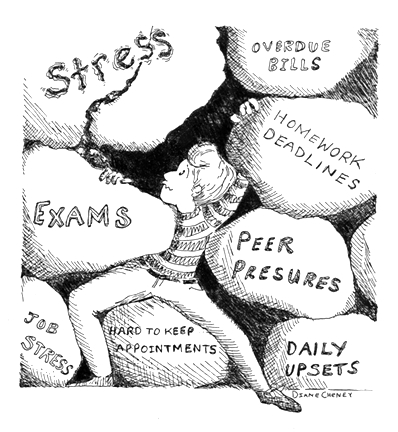A couple of months ago, the Toronto District School Board (TDSB) released the results from one of the largest school surveys ever completed. The survey, which asked high school students about their mental health, revealed some very grim findings about the stress and anxiety that our adolescent students face today. The TDSB survey, in addition to the high number of suicides at our universities this past year, has sparked a nation-wide conversation about the mental health status of students in Canada.
Kate Hammer from the Globe and Mail wrote the following article about this situation and provided insight from a local psychologist on the matter:
[Excerpt from “School Study Paints A Picture of Teens Under Pressure”]
Although teenagers today may face fewer demands than those who grew up during a depression or a war, they’re dealing with a high level of uncertainty, according to Toni Atkinson, a clinical psychologist who works at several clinics in the Toronto area. The constant connectivity that social media and cellphones provide means teens are wiser, and also less naive than ever before, Dr. Atkinson said. This is a double-edged sword for an age group facing competitive university admissions, rising tuition costs and an uncertain job market.
The full article can be read on the Globe and Mail website: http://www.theglobeandmail.com/news/toronto/school-study-paints-a-picture-of-teens-under-pressure/article8485352/
Student Stress is Normal
As school psychologists in Toronto, our team at Valentin and Blackstock Psychology has extensive experience working with teenagers and school boards. We believe that teenagers always have and always will face stress. It is a natural process that comes with the obvious pressures at that age: getting good grades, making choices about post-secondary education, and experiencing their first intimate relationships. Unfortunately, a bleak economic market has resulted in higher competition and uncertainty about the future for today’s young people. In addition, social media connectivity has resulted in stresses that we previously did not know existed. At the same time, this is not the first time in history that our external environment has created additional stress for young people. Today’s stress may be different from that of our grandparents, but it is still stress.
In contrast to the findings, through our psychological practice with teenagers, we have found that they are very resilient and adaptive. Most young people we work with have the capacity and ability to handle academic, social and family pressures. The stress they face is a natural progression into adulthood. The staggering numbers found from the TDSB study must be taken with caution. This is the first time such a study has been conducted and no previous data is available for comparison. Many teenagers feel stress, anxiety and pressures for success and it can be assumed that similar results would be obtained if this survey were conducted in the 1950s. Many media and government bodies are calling this a ‘mental health crisis’. We believe this is simply awareness of a pre-existing issue that is finally receiving attention.
Increased Awareness Is Positive
That being said, the attention this issue is getting is positive for those teenagers who are emotionally or cognitively vulnerable for one reason or another reason. From our experience, these individuals are more susceptible to psychological difficulties. They may react somatically to stress, self-medicate with drugs, or even give up on their goals of achievement and drop out of school. It is the job of parents, teachers and mental health providers to recognize the early symptoms of chronic stress and provide support.The benefit of the TDSB study is increased awareness on what to look for and how to deal with it. We believe stress management education at an early age can be helpful in this regard. In addition, a psychoeducational assessment can help students determine their strengths and weaknesses related to their academics and provide individualized and appropriate learning strategies.
Overall, parents, teachers and teenagers must understand that it is not bad to be stressed. Life changes are scary and stress is a normal part of that. It is when teenagers become chronically stressed that we should be armed with the appropriate tools and education for support. It is at this time that it is crucial for us to teach adolescents how to balance their life and make priorities.

